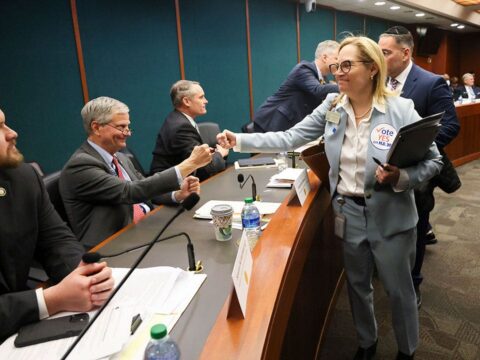Controversial Dutch politician Geert Wilders has won a massive victory in an election, positioning him to form the next ruling party and potentially become Netherland’s next prime minister. Wilders, 60, has long been likened to the “Dutch Donald Trump,” for his brand of populist politics. But unlike the former U.S., he seemed destined to a lifetime in the opposition. An exit poll revealing his landslide appeared to take Wilders by surprise.In his first reaction, posted in a video on X, formerly Twitter, he spread his arms wide, put his face in his hands and said simply “35!” — the number of seats an exit poll forecast his Party for Freedom, or PVV, won in the 150-seat lower house of parliament. Geert Wilders, leader of the Party for Freedom, known as PVV, smiles after announcement of the first preliminary results of general elections in The Hague, Netherlands, Wednesday. (AP Photo/Peter Dejong)The only time Wilders came close to governing was when he supported the first coalition formed by Prime Minister Mark Rutte in 2010. But Wilders did not formally join the minority administration and brought it down after just 18 months in office in a dispute over austerity measures. Since then, mainstream parties have shunned him.SLOVAKIA’S GOVERNMENT, LED BY FIERY CRITICS OF UKRAINE AND JOURNALISTS, SURVIVES MANDATORY CONFIDENCE VOTE”The PVV wants to, from a fantastic position with 35 seats that can totally no longer be ignored by any party, cooperate with other parties,” he told cheering supporters at his election celebration in a small bar in a suburb of The Hague.Wilders’ incendiary rhetoric against Islam has made him a target for extremists and led to him living under round-the-clock protection for years. He has appeared in court as a victim of death threats, vowing never to be silenced. He has moved from one safe house to another over nearly two decades. Geert Wilders, leader of the Party for Freedom, known as PVV, casts his ballot while flanked by security agents in The Hague, Netherlands, Wednesday. (AP Photo/Mike Corder)In 2009, the British government refused to let him visit the country, saying he posed a threat to “community harmony and therefore public security.” To court mainstream voters this time around, Wilders toned down the anti-Islam rhetoric and sought to focus less on what he calls the “de-Islamization” of the Netherlands and more on tackling practical issues such as housing shortages, a cost-of-living crisis and access to good health care.CLICK HERE TO GET THE FOX NEWS APPHis campaign platform nonetheless calls for a referendum on the Netherlands leaving the European Union, an “asylum stop” and “no Islamic schools, Qurans and mosques,” although he pledged Wednesday night not to breach Dutch laws or the country’s constitution that enshrines freedom of religion and expression.The Associated Press contributed to this report. Bradford Betz is a Fox News Digital breaking reporter covering crime, political issues, and much more.Â
Breaking News
2024-10-27 A man who abused up to 3,500 girls online has been sentenced for crimes including manslaughter
2024-10-27 Rear Admiral Claims Government COVERED UP Alien Contact. We’ve Talked with ALIENS????
2024-10-27 BREAKING: UN Sec Council Passes Gaza Aid, US Sits Out; Trump Audio EXPOSES Pressure On MI Officials
2024-10-27 Missing Juvenile Aamina Turner from the 12th District – Blotter
2024-10-27 Missing Endangered Person Ivelisse Lugo from the 2nd District – Blotter
Static News
500k views later The FLORIDA...
phillynews215 2021-04-27 50 Comments on Body Cam: Officer Fatal Shooting Man with a Sword – Pomona Police March 30- 2020
#officerinvolvedshooting #policeshooting #Pomona Policedepartment Please...
phillynews215 2021-04-27 50 Comments on Bodycam Shows Deputies Shooting Armed Suspect in Greenville, South Carolina
** (Disclaimer: This video content...
Video brought to you by...
Rafael Nieves 2024-10-27 0 Comment on A man who abused up to 3,500 girls online has been sentenced for crimes including manslaughter
A "relentless and cruel" online...
Rafael Nieves 2024-10-27 38 Comments on Rear Admiral Claims Government COVERED UP Alien Contact. We’ve Talked with ALIENS????
Robby Soave and Briahna Joy...
Rafael Nieves 2024-10-27 0 Comment on BREAKING: UN Sec Council Passes Gaza Aid, US Sits Out; Trump Audio EXPOSES Pressure On MI Officials
The Hill’s Kevin Cirilli recaps...
Rafael Nieves 2024-10-27 0 Comment on Missing Juvenile Aamina Turner from the 12th District – Blotter
The Philadelphia Police Department is...
Rafael Nieves 2024-10-27 0 Comment on Missing Endangered Person Ivelisse Lugo from the 2nd District – Blotter
The Philadelphia Police Department is...
Check out my NEW SECOND...
phillynews215 2024-04-13 34 Comments on Israel-Hamas war: Hezbollah terrorists fire at Israeli civilians from Lebanon | LiveNOW from FOX
Hezbollah claiming responsibility for firing...
phillynews215 2024-04-02 Comments Off on Making a DONATED 200,000 Mile Twin Turbo BMW Look and Drive like NEW! (and then ENGINE MALFUNCTION)
We add a ton of...
phillynews215 2023-01-04 Comments Off on Albuquerque Police Department APD Junior Police Academy Summer Camp Shout Out
Kids give a shout out...
I ain't Pulling over yo...
Proudly powered by ANGELHOUSE 2009 - 2024 | ALL YOUTUBE VIDEOS IS A REGISTERED TRADEMARK OF GOOGLE INC. | THE YOUTUBE CHANNELS AND BLOG FEEDS IS MANAGED BY THE RIGHTFUL OWNERS/CREATORS HOSTING BY PHILLYFINESTSERVERSTATS INC. ALL RIGHTS RESERVED




















